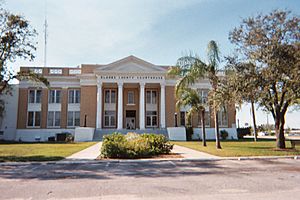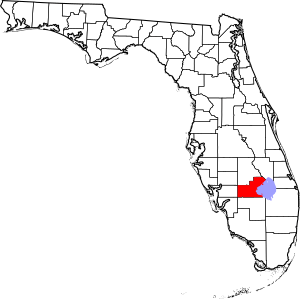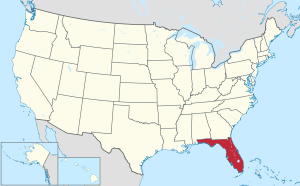Glades County, Florida facts for kids
Quick facts for kids
Glades County
|
|
|---|---|

Glades County Courthouse
|
|

Location within the U.S. state of Florida
|
|
 Florida's location within the U.S. |
|
| Country | |
| State | |
| Founded | April 23, 1921 |
| Named for | Florida Everglades |
| Seat | Moore Haven |
| Largest city | Moore Haven |
| Area | |
| • Total | 987 sq mi (2,560 km2) |
| • Land | 806 sq mi (2,090 km2) |
| • Water | 181 sq mi (470 km2) 18.3%% |
| Population
(2020)
|
|
| • Total | 12,126 |
| • Density | 16/sq mi (6/km2) |
| Time zone | UTC−5 (Eastern) |
| • Summer (DST) | UTC−4 (EDT) |
| Congressional district | 17th |
Glades County is a county located in the Florida Heartland region of the U.S. state of Florida. As of the 2020 census, about 12,126 people live here. This makes it the fourth-least populated county in Florida. Its main town, called the county seat, is Moore Haven.
Glades County is part of the Clewiston micropolitan area. This is a smaller city area that also includes Hendry County. These two counties, along with the larger Cape Coral-Fort Myers-Naples area, form a bigger connected region.
Contents
Awards and Recognition
Glades County and its communities have received special awards.
Muse: Florida's Outstanding Rural Community
In 2002, the community of Muse won the "Florida's Outstanding Rural Community of the Year" award. Governor Jeb Bush recognized Muse for providing a safe shelter during storms. This helped keep people safe when bad weather hit.
Muse: Firewise Service Award
The community of Muse also received a "10 Year Firewise Service Award." This award was given by the Florida Forest Service. It recognized Muse's hard work in preventing wildfires. The community worked together to clear away plants that could easily catch fire. This helped protect their homes and the area from dangerous wildfires.
History of Glades County
The land that is now Glades County has a long and interesting history.
Early People and New Arrivals
For thousands of years, Indigenous people lived in this area. When Europeans arrived, many native tribes became smaller due to fighting and new diseases. In the 1700s, during Spanish rule, Native American groups like the Creek moved into Florida from Georgia.
Also, Africans and African Americans who escaped slavery found safety here. They created free communities called maroon communities. Some were even given freedom by the Spanish if they helped in their armies. Over time, these different groups came together to form the Seminole nation. Some people of African descent lived near the Seminoles and were known as Black Seminole.
Seminole Wars and County Creation
In the 1800s, there were conflicts called the Seminole Wars. Many Seminole and Black Seminole people were forced to move to Indian Territory (now Oklahoma). This happened because more Anglo-American settlers wanted to live in Florida.
Glades County was officially created in 1921. It was formed from parts of Desoto County. The county was named after the Florida Everglades. However, most of Glades County is actually open prairie and pine forests, not swampy Everglades.
Lake Okeechobee and Local Traditions
Glades County is one of five counties around Lake Okeechobee. This large lake is a central part of the region. The Lake Okeechobee Scenic Trail also runs through the area.
Glades County hosts one of Florida's oldest yearly festivals, called Chalo Nitka. This festival celebrates local history and culture. It also highlights the long and friendly relationship between the local Seminole groups and the settlers of Glades County. The Brighton Seminole Indian Reservation is located within the county.
Geography and Climate
Glades County covers a total area of about 987 square miles. About 806 square miles of this is land, and 181 square miles (18.3%) is water.
Fisheating Creek
Fisheating Creek is an important stream that flows into Lake Okeechobee. It is the only natural river that still flows freely into the lake. It is also the second-largest natural water source for the lake.
Nearby Counties
Glades County shares borders with several other counties:
- Highlands County, Florida - to the north
- Okeechobee County, Florida - to the northeast
- Martin County, Florida - to the east
- Palm Beach County, Florida - to the southeast
- Hendry County, Florida - to the south
- Lee County, Florida - to the southwest
- Charlotte County, Florida - to the west
- DeSoto County, Florida - to the northwest
County Climate
Glades County has a warm climate. Here's a quick look at the average temperatures and rainfall:
| Climate data for Glades County, Florida (1980-2010) | |||||||||||||
|---|---|---|---|---|---|---|---|---|---|---|---|---|---|
| Month | Jan | Feb | Mar | Apr | May | Jun | Jul | Aug | Sep | Oct | Nov | Dec | Year |
| Mean daily maximum °F (°C) | 73.7 (23.2) |
76.3 (24.6) |
80.0 (26.7) |
84.1 (28.9) |
89.3 (31.8) |
91.1 (32.8) |
91.8 (33.2) |
91.8 (33.2) |
90.1 (32.3) |
86.1 (30.1) |
80.2 (26.8) |
75.1 (23.9) |
84.1 (29.0) |
| Mean daily minimum °F (°C) | 47.8 (8.8) |
50.9 (10.5) |
54.6 (12.6) |
58.0 (14.4) |
64.6 (18.1) |
70.2 (21.2) |
71.8 (22.1) |
72.4 (22.4) |
71.4 (21.9) |
65.2 (18.4) |
57.3 (14.1) |
51.1 (10.6) |
61.3 (16.3) |
| Average precipitation inches (mm) | 1.9 (48) |
2.5 (64) |
3.3 (84) |
2.3 (58) |
3.3 (84) |
8.6 (220) |
7.7 (200) |
7.9 (200) |
6.7 (170) |
2.7 (69) |
2.0 (51) |
1.9 (48) |
50.8 (1,296) |
| Source: USA.com | |||||||||||||
People of Glades County
| Historical population | |||
|---|---|---|---|
| Census | Pop. | %± | |
| 1930 | 2,762 | — | |
| 1940 | 2,745 | −0.6% | |
| 1950 | 2,199 | −19.9% | |
| 1960 | 2,950 | 34.2% | |
| 1970 | 3,669 | 24.4% | |
| 1980 | 5,992 | 63.3% | |
| 1990 | 7,591 | 26.7% | |
| 2000 | 10,576 | 39.3% | |
| 2010 | 12,884 | 21.8% | |
| 2020 | 12,126 | −5.9% | |
| 2023 (est.) | 12,786 | −0.8% | |
| U.S. Decennial Census 1790-1960 1900-1990 1990-2000 2010-2019 |
|||
As of the 2020 United States census, there were 12,126 people living in Glades County. These people lived in 4,859 households, with 3,247 of them being families.
In 2020, the racial makeup of the county was:
- About 58.8% were White (not Hispanic or Latino).
- About 11.8% were Black or African American (not Hispanic or Latino).
- About 1.6% were Native American or Alaska Native (not Hispanic or Latino).
- About 25.1% were Hispanic or Latino (of any race).
- Smaller percentages were Asian, Pacific Islander, or Mixed/Multi-Racial.
In 2000, about 22.1% of the population was under 18 years old. The median age was 40 years. This means half the people were older than 40 and half were younger.
Education in Glades County
Students in Glades County attend several schools:
- Moore Haven Elementary School
- Moore Haven Middle-High School
- West Glades School in Muse
- Pemayetv Emahakv Charter School on the Brighton Seminole Reservation
Energy and Environment
In 2007, there were plans to build a large coal-fired power plant in Glades County. This plant would have been located near Lake Okeechobee. However, the Florida Public Service Commission decided not to allow it to be built.
The Glades County Commission also approved the building of a 200-acre landfill in 2007. This landfill is located on the southwest shore of Lake Okeechobee.
Libraries
Glades County is part of the Heartland Library Cooperative. This group of libraries serves Glades County and nearby counties like Okeechobee, Highlands, Hardee, and DeSoto. The only library branch located in Glades County is the Moore Haven branch.
Communities in Glades County
Glades County has several different types of communities.
Indian Reservation
County Seat
Census-Designated Places
These are areas that are like towns but are not officially incorporated as cities.
- Buckhead Ridge
- Port LaBelle (part of this area is in Glades County)
Other Unincorporated Communities
These are smaller communities that are not officially part of a city or town.
Memorials
The Community Center in Glades County has a special memorial. It honors Jim J. Greer, a veteran of the U.S. Air Force. He served as the Glades County Tax Collector from 1994 to 2000. The memorial recognizes his excellent service to the communities of Muse and Glades County.
Images for kids
See also
 In Spanish: Condado de Glades para niños
In Spanish: Condado de Glades para niños
 | Lonnie Johnson |
 | Granville Woods |
 | Lewis Howard Latimer |
 | James West |


